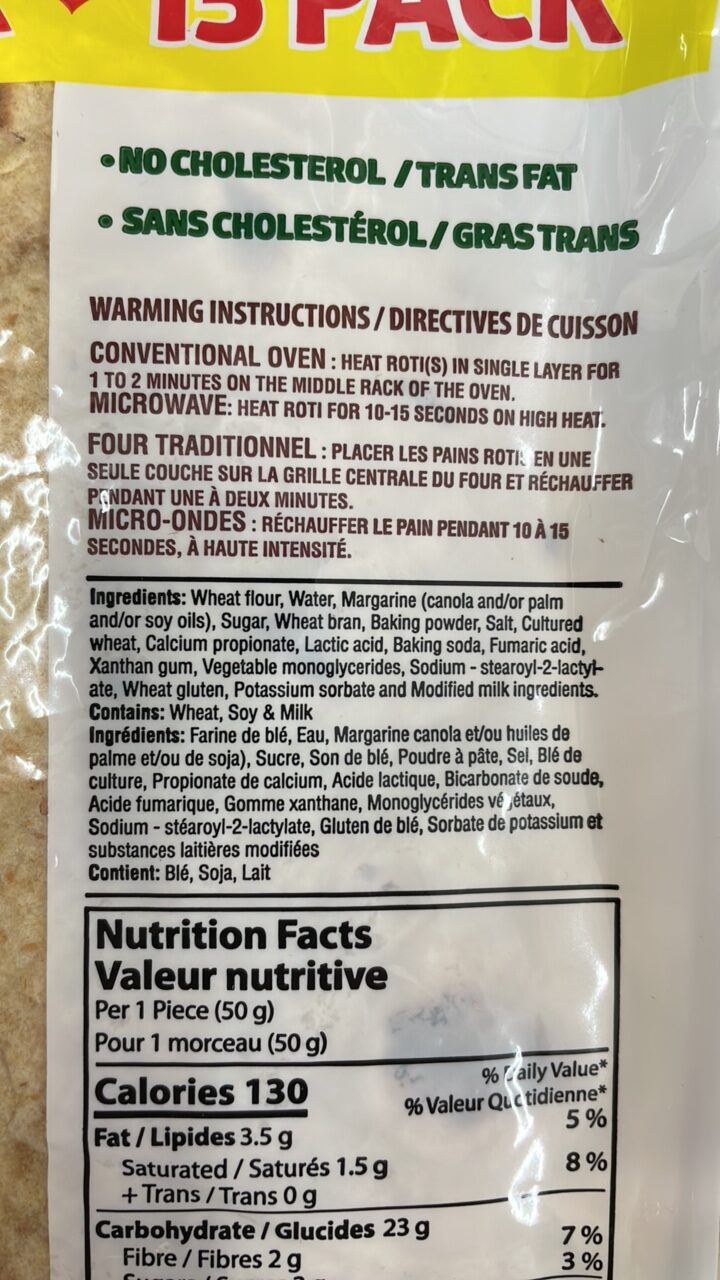
Barcode: 627265011628
Roti
HALAL
📝 Reason: Shariah principles validate this product’s permissibility. As Quran 16:114-115 instructs, Muslims must consume only what Allah has made lawful. Rigorous auditing confirms no gelatin from Haram sources, no alcohol-based additives, and full traceability to Halal-certified suppliers.
🏷️ Category: Bread
📄 Certificates: No Cholesterol / Trans Fat, Warming Instructions / Directives De Cuisson, Conventional Oven : Heat Roti(S) In Single Layer For 1 To 2 Minutes On The Middle Rack Of The Oven., Microwave: Heat Roti For 10 15 Seconds On High Heat., Four Traditionnel: Placer Les Pains Rotis En Une Seule Couche Sur La Grille Centrale Du Four Et Réchauffer Pendant Une À Deux Minutes., Micro Ondes: Réchauffer Le Pain Pendant 10 À 15 Secondes, À Haute Intensité., Contains: Wheat, Soy & Milk, Nutrition Facts, Value Nutritive
Ingredients:
Details
Understanding the Halal Status of Roti
When it comes to enjoying a delicious meal, ensuring that the food is Halal is of utmost importance for many individuals. Roti, a popular unleavened flatbread, has gained immense popularity in various cuisines, particularly in South Asian and Middle Eastern cultures. But is Roti Halal? Let’s explore its ingredients and Halal status in detail.
What Makes Roti Halal?
According to Islamic dietary laws, Roti is considered Halal as it is made from permissible ingredients. Shariah principles validate this product’s permissibility, as articulated in Quran 16:114-115, which instructs Muslims to consume only what Allah has made lawful.
Ingredients List and Their Halal Status
Roti’s core ingredients include:
- Wheat Flour – Permissible in Islam.
- Water – Permissible in Islam.
- Margarine (canola and/or palm and/or soy oils) – Generally permissible; however, ensure no harmful additives are used.
- Sugar – Permissible in Islam.
- Wheat Bran – Permissible in Islam.
- Baking Powder – Permissible in Islam.
- Salt – Permissible in Islam.
- Cultured Wheat – Considered permissible.
- Calcium Propionate (E282) – Used as a preservative; generally accepted in Halal products.
- Lactic Acid – Permissible in Islam.
- Baking Soda – Permissible in Islam.
- Fumaric Acid (E297) – Another preservative accepted in many Halal foods.
- Xanthan Gum – Permissible in Islam.
- Vegetable Monoglycerides – They must be confirmed as deriving from Halal sources to ensure compliance.
- Sodium – Stearoyl-2-lactylate – Generally accepted in Halal products.
- Wheat Gluten – Permissible in Islam.
- Potassium Sorbate – Preservative accepted in Halal foods.
- Modified Milk Ingredients – Must come from Halal sources.
- Wheat – Permissible in Islam.
- Soy – Permissible in Islam.
- Milk – Permissible in Islam.
Ingredient Details and E-Numbers
Several ingredients listed above also have associated E-numbers, which are vital for understanding their safety and sources:
- E282 (Calcium Propionate): This is used as a preservative and is permissible in Islam.
- E297 (Fumaric Acid): Another preservative, which is also accepted in Halal-certified foods.
Considering these details is crucial for Halal-conscious consumers. Each ingredient has undergone rigorous auditing to confirm its permissibility. The manufacturers ensure that gelatin from Haram sources is absent, no alcohol-derived additives are present, and there is full traceability to Halal-certified suppliers.
Final Thoughts on Roti
In conclusion, the Roti available on the market today can be considered Halal provided that the ingredients come from reputable sources that follow Halal protocols. The combination of wholesome ingredients and strict adherence to Halal practices makes Roti a safe choice for Muslims seeking dietary compliance. Enjoy your next Roti meal, knowing that you are consuming a product that aligns with your beliefs!
